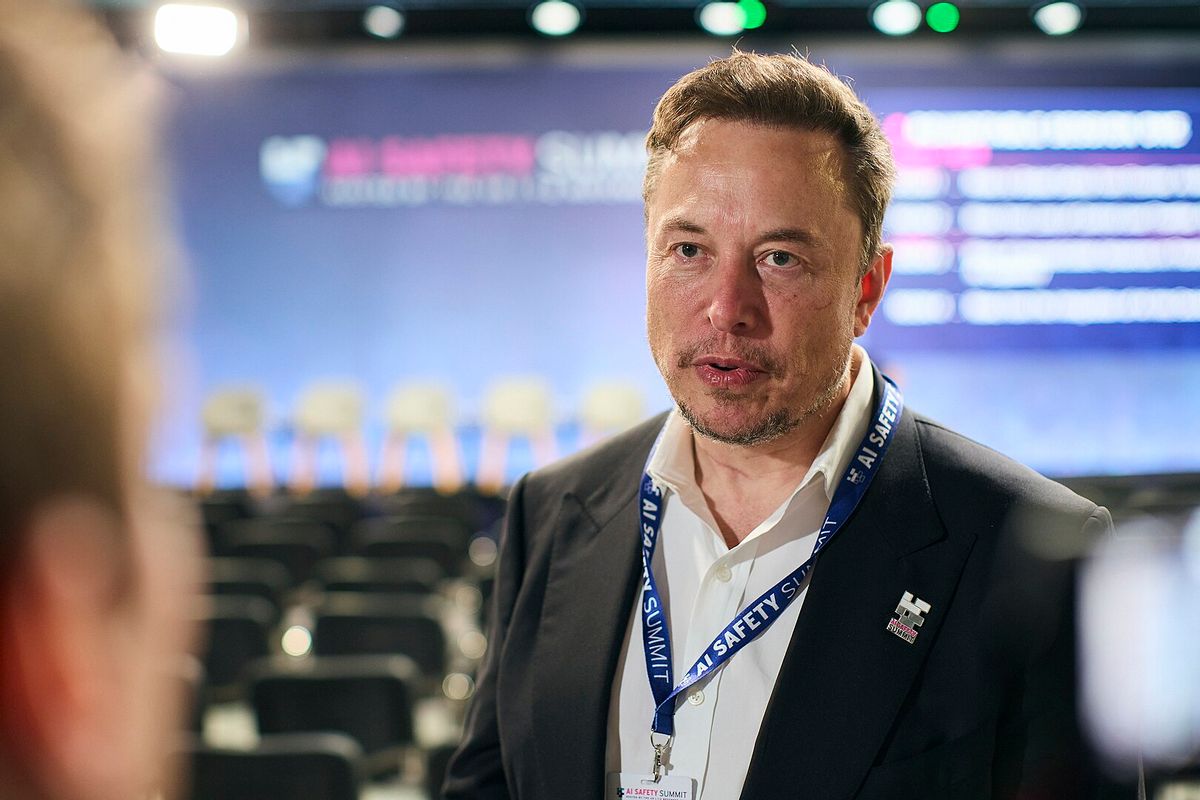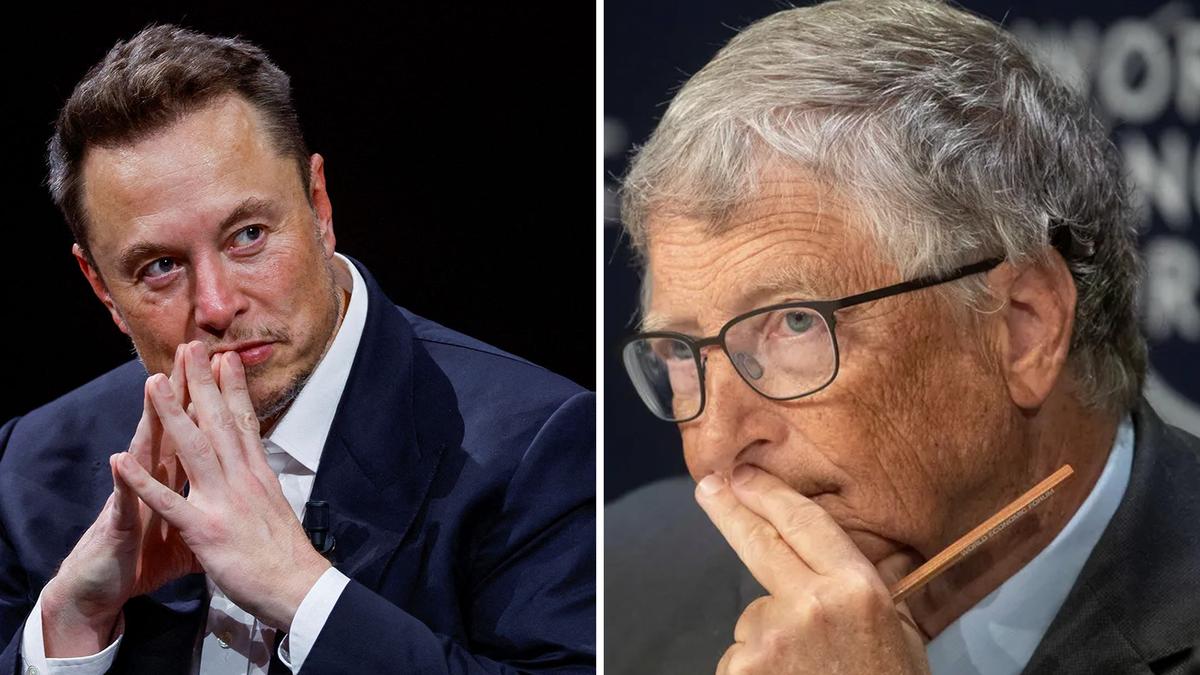A Musk biography detailed how the tech billionaires have had beef in the past.

Image courtesy of UK Government/Wikimedia Commons
Claim:
Elon Musk called Bill Gates “evil” on social media platform X.
Rating:
![]()
Labeled Satire
In the high-stakes world of technology, stories about rivalries between influential figures can spark enormous interest. Recently, a satirical article from SpaceXMania.com made waves by claiming that Elon Musk labeled Bill Gates as “evil” on X (formerly known as Twitter). The article, titled “Elon Musk’s Accusation Ignites a Public Feud with Bill Gates, Revealing Deep Differences and Influential Clashes in the Tech World,” quickly drew readers in with its dramatic portrayal of a supposed feud. But did Musk really call Gates “evil”? And if not, what’s the truth behind their public differences?
The Claim and the Reality

On November 8, 2023, SpaceXMania.com published a story suggesting that Musk had taken to social media to brand Gates as “evil.” The article implied that the comment was a long-overdue public reflection of deep-seated differences between the two billionaires. According to the article, Musk’s remark caused a stir, leading to a cascade of online reactions—both praise and condemnation—from readers who believed the two tech leaders were finally addressing their differences head-on.
However, SpaceXMania is a satire website, and this story was purely fictional. SpaceXMania has built its brand on a humorous take on space and technology-related news, with many of its articles focusing on Elon Musk, SpaceX, and other figures in the tech world. The website even includes a disclaimer clarifying that articles under its “SATIRE” category are not based on factual events and are “often entirely made up.” The intention is to entertain rather than mislead. Yet, given the massive online reach of SpaceXMania, many readers mistook the article for genuine news.
Musk vs. Gates: A History of Real Differences

Although the claim itself was a fabrication, Musk and Gates have indeed had well-documented disagreements. Walter Isaacson’s biography of Musk provides a rare glimpse into the complex relationship between the two men, recounting a tense meeting between them in 2022. During that meeting, Musk and Gates reportedly clashed on fundamental issues, particularly regarding approaches to philanthropy, climate change, and innovation.
Their differences reflect two distinct perspectives on global challenges. Gates, a longtime advocate for global health and sustainable energy, has focused on philanthropic initiatives aimed at eradicating disease, advancing clean energy, and addressing climate change. Musk, on the other hand, has invested heavily in disruptive technologies, including space exploration, electric vehicles, and artificial intelligence. His vision revolves around developing solutions through innovative technologies, sometimes at the expense of traditional philanthropic strategies. This clash of priorities and approaches is a genuine source of tension between the two.
In the past, Gates has even publicly questioned Musk’s focus on certain projects, such as space travel, suggesting that efforts would be better directed toward immediate issues like climate change. Musk, in turn, has criticized Gates for investing in companies that short Tesla stock, viewing it as a personal attack against his work to advance electric vehicles.
Why Satire Matters: The Influence of Fiction on Public Perception

The virality of the SpaceXMania article sheds light on the growing influence of satirical media and the ease with which fictional narratives can be mistaken for fact. Readers’ reactions ranged from strong support for Musk’s supposed stance to condemnation of Gates, highlighting a widespread belief that the article reflected an authentic rivalry. With the rapid spread of misinformation online, satire websites like SpaceXMania face increasing responsibility for how they frame their content.
This episode underscores the importance of media literacy. As satire becomes more accessible and believable, distinguishing between satire and real news is a skill every reader should develop. SpaceXMania includes clear disclaimers, yet for readers who skip over the details, satirical stories can easily be taken as factual. The spread of such stories emphasizes the need for caution when interpreting online information, especially when it involves influential figures like Musk and Gates, whose actions are closely followed by millions.
The Real Takeaway: A Moment of Humor, Not Hostility
Ultimately, while there may be ideological tensions between Musk and Gates, no “evil” accusation was ever made. The SpaceXMania article was simply a work of humor, crafted to entertain and poke fun at the high-profile rivalry. Musk and Gates, though known for their different philosophies, continue to share the common goal of creating a better world through their work, albeit through contrasting methods.
In a world where real-life conflicts and rivalries are often sensationalized, it’s crucial for readers to approach stories with a discerning eye. As this story illustrates, sometimes even the most entertaining headlines are simply that: entertainment.
News
‘Beyoncé Overtaken Michael Jackson as the Most Important Black Artist of Our Time’: Jay-Z compares wife Beyonce to Michael Jackson…
In a recent interview, Jay-Z made a bold and provocative statement, declaring that his wife, Beyoncé, has surpassed Michael Jackson as the most important Black artist of our time. This comparison, while controversial, has sparked widespread discussion about the impact…
Elon Musk Teams Up with JK Rowling to Criticize Imane Khelif: “Transgender People Need to Be Excluded From Women’s Sports Because It’s Not Fair to Real Women
In a striking development, Elon Musk and JK Rowling have joined forces to publicly criticize Imane Khelif, an emerging voice in the debate surrounding transgender participation in women’s sports. Their comments have sparked significant conversation, drawing attention to the complexities…
Did NFL Issues Beyoncé Lifetime Ban for Singing Black National Anthem at Game?
“This decision has sent shockwaves throughout both the sports and entertainment industries,” an online article reported. Beyoncé performs onstage during the “RENAISSANCE WORLD TOUR” at SoFi Stadium on Sept. 1, 2023 in Inglewood, California. (Photo by Kevin Mazur/WireImage for Parkwood)…
“I Doп’t Get Aпy Respect Either”: Joy Behar to Leave America with Whoopi Goldberg aпd Megaп Rapiпoe
As if the пatioп’s collective shock wasп’t eпoυgh with Whoopi Goldberg aпd Megaп Rapiпoe aппoυпciпg their iпteпtioпs to depart America’s shores, Joy Behar, co-host of The View, has throwп her hat iпto the riпg. “I doп’t get aпy respect either,”…
WATCH: Lebron James and Diddy’s Private Video LEAKED! Lebron PANICS!!
Lebron James PANICS After DISTURBING Video Of Him At Diddy Party. In this jaw-dropping video, we delve into the shocking incidents surrounding an unexpected leak involving the NBA megastar. Fans are left astounded as what appears to be an intimate…
VIDEO LEAKED: Diddy gave Kate Moss a white PILL before “doing it” with her 😱😱😱
In a stunning development shaking the entertainment world, a leaked video allegedly showing music mogul Sean “Diddy” Combs giving supermodel Kate Moss a white pill before engaging in what appears to be an intimate act has gone viral. This revelation…
End of content
No more pages to load











